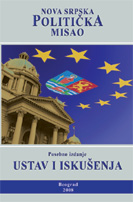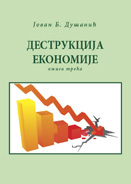| NSPM in English | |||
Recognizing Kosovo Least Bad Option for United States |
 |
 |
 |
| понедељак, 10. март 2008. | |
|
CFR Senior Fellow Charles A. Kupchan says he is disappointed by the lack of UN backing for Kosovo's independence, and its “shaky” legal standing. Since Kosovo declared independence in February, thirty-three countries have recognized the country or stated their intention to do so, with another twenty or so trying to decide. Kupchan says that pragmatically, recognizing Kosovo was the best solution for the United States. “It was the best of a whole set of very bad options,” he says. • It's been about three weeks since Kosovo announced its independence from Serbia, a move that led to fairly quick recognition by the United States and several major European countries. As of this date, about how many countries have now recognized Kosovo? • If you include countries that have stated their intent to do so, and are working the recognition through a legal or parliamentary procedure, you get roughly thirty-two, thirty-three countries thus far. And then there are another twenty or so that have said that they are in the midst of deliberations, and they are making up their minds about whether to recognize the state. And then another twenty that have actually come out and said: “We oppose the separation of Kosovo from Serbia; we will not recognize the new state.” There are many, many countries that simply have said nothing. • And of the major powers, Russia we know has said, “Never.” Has China said anything? • China has come out on the record as opposed. • In general, the countries that have opposed Kosovo's independence are either those that side with Russia diplomatically; they would generally be countries of the former Soviet Union. Also in this group are those that have some kind of ethnic secessionist movement inside them, such as Sri Lanka, Cyprus, China, Spain. These are countries that are worried about the integrity of their own territory. • What about Georgia? • Georgia, to the best of my knowledge has actually sided with Russia on this issue. Not because of its great love for Moscow —on the contrary. Relations between the two states are very tense. It is because the Georgians are worried about the possible impact of Kosovo's secession on Abkhazia and South Ossetia. They worry that the Abkhaz and the South Osessetians will say, “Well if Kosovo can leave Serbia, then we can leave Georgia.” • Of course we've had a new president elected in Moscow, and he takes office in May, but President Putin has given him some of the authority already. Can we expect anything different out of Moscow, you think, under President Dmitri Medvedev? • The one data point that we have thus far is that Medvedev has already visited Belgrade. • And when he was there, he supported Belgrade's rejection of Kosovo's independence and presided over the planning to build a pipeline that would run through Serbia. So in that sense, his first act as president-to-be was to do something that was quite provocative in terms of relations with the West. • In terms of where Medvedev will take Russian foreign policy, there are two alternative ways to see things. On the one hand, he is someone who doesn't bring to the office a background as a KGB officer in the security services. He has a business background and a law background, and he has spoken over the last several months about his desire to strengthen rule of law, and to try to bring back a level of liberalism to Russian politics that disappeared under Putin. And so his natural instincts may be toward a domestic policy and a foreign policy that loses the sharp edges of Putin's rule. • On the other hand, it's clear that there will be some jockeying for position once the new government takes office. Putin and Medvedev have to figure out their relationship. There will be factional infighting in the Kremlin as Putin insiders are threatened by those people that Medvedev brings in. And in general, when democratizing states go through periods of political instability, nationalism and hard-line policies tend to win out because they're the ones who are taking advantage of chaos and the political uncertainly to rally support. That would argue that even if Medvedev's instincts might be more liberal, he will have a hard time bringing them to bear on Russian foreign policy given the political landscape inside Russia . • Serbia's an interesting case of a country torn by what it wants to do: whether it wants to be part of the European Union or wants to remain Serbian nationalist to the end. How do you think this could resolve itself? • The separation of Kosovo from Serbia has been a body blow to Serbs both inside Serbia and in the diaspora. And so there really isn't much of a divide on that question. But the fundamental issue going forward is how should Serbia react to what it sees as a grievous injustice and an illegal act. The Serb prime minister, Vojislav Kostunica, is basically arguing that European and American support for Kosovo's independence should be seen as a reason for Serbia to break off its westward orientation. The president, Boris Tadic, who was reelected just before Kosovo's declaration of independence, is equally opposed to the secession of Kosovo, but argues that Serbia should continue its westward orientation nonetheless. • Right now, those two views are competing for predominance within the elite in Belgrade and the Serb electorate. It's too soon to tell who will win out. It's safe to say, however, that if Serbia does break off its negotiations with the European Union about eventual entry, it is principally Serbia and its population that will suffer. And ultimately, because of that reality, it's a question of when, rather than if, when it comes to Serbia 's attachment and integration into Europe . • Now, alongside this question of European membership is the effort of Serbs in northern Kosovo to secede and make it part of Serbia —as it was when all of Kosovo was part of Serbia . Where do you think that issue is going to go? • The issue of northern Kosovo has been in play quietly for several years. There were reports dating back several years ago that discussions about Kosovo's potential separation from Serbia included or could potentially include a deal whereby the north would stay with Serbia and Kosovo would be partitioned. That prospect was rejected by the international community and by Pristina. As a result, Kosovo's secession occurred and the territory includes northern Kosovo, which represents about 15 percent of the territory. That part of the country is predominantly Serb and even during the period of UN trusteeship between 1999 and 2008, it remained attached to Serbia in a de facto sense, spiritually and politically. It's going to be quite difficult to bring northern Kosovo into the new state because, at least for now, the people that live there want no part of that new state and continue to direct their loyalties to Belgrade. The question now is what happens on the ground. Can NATO [North Atlantic Treaty Organization], the EU, and the UN succeed in creating sufficient inducement and putting enough pressure on the north to ensure that over time, it gradually integrates with the rest of Kosovo? • On the other hand, I suppose the Kosovo government could just decide to say “Go to Serbia.” • There are several different problems that would emerge should that happen—should the north secede. The Serbs that remain in the rest of Kosovo would find themselves increasingly isolated because the Serb population inside Kosovo would drop by a third. And it might then become more difficult to encourage those Serbs who live in the south, who live in small enclaves, to stay put. • There are significant Albanian populations in Serbia that do not live in Kosovo. Just to the east of Kosovo's border with Serbia is an area called the Presevo Valley, which is heavily populated by Albanians. And there is concern that if northern Kosovo were to secede and reattach itself to Serbia, there would be a drive to attach the Presevo Valley to the new Kosovo. And then that could open a Pandora's box in which small ethnic enclaves throughout the Balkans then stand up and say, “Well, what about us?” • So it's really a very messy situation right now. • It's a very messy and very dangerous situation. I have to say that I'm somewhat surprised that the situation on the ground has remained as quiet as it has in the past few days. • There have been reports of the railroad workers and the police in northern Kosovo saying they no longer worked for the Kosovo government but for Serbia . This is a de facto secession, right? • I would say that spiritually and politically, the north does not recognize that it is now part of a new state. That's one of the reasons that there have been attacks on the border between northern Kosovo and Serbia, because Serbs living to the north and to the south of that border don't recognize it as a border. • There's no easily negotiable solution, is there? • No, there's no easily negotiable solution. For the last year, year and a half, the international community brokered negotiations between Pristina and Belgrade, and it became quite apparent that there was no common ground whatsoever. And that's why we came on February 17 to a unilateral declaration of independence despite Belgrade 's opposition. And therefore, it's quite hard to imagine that some kind of consensual agreement is going to emerge after Belgrade has been dealt this blow. It's possible that, were the north to secede from the rest of Kosovo, Belgrade would take some satisfaction in that development. But that development is more likely to occur come what may than because there is a negotiated move in that direction. • But overall, you think this was a good move by the international community to go ahead with the independence of Kosovo? • It was the best of a whole set of very bad options. And I'm troubled by the fact that there was no UN support and that, as a result, this separation occurs in a legally shaky way. But I do think that, from the perspective of pragmatism—that is to say, what scenario is most likely to bring lasting peace to the Balkans?—it makes more sense to separate Kosovo from Serbia, and to try to bring a close to the continuing dissolution of the former Yugoslavia, than to leave Kosovo inside Serbia and wait for what would probably be yet another round of ethnic conflict. http://www.cfr.org/publication/15688/pragmatism_on_kosovo.html?breadcrumb=/
|
Од истог аутора
Остали чланци у рубрици
- Playing With Fire in Ukraine
- Kosovo as a res extra commercium and the alchemy of colonization
- The Balkans XX years after NATO aggression: the case of the Republic of Srpska – past, present and future
- Из архиве - Remarks Before the Foreign Affairs Committee of the European Parliament
- Dysfunction in the Balkans - Can the Post-Yugoslav Settlement Survive?
- Serbia’s latest would-be savior is a modernizer, a strongman - or both
- Why the Ukraine Crisis Is the West’s Fault
- The Ghosts of World War I Circle over Ukraine
- Nato's action plan in Ukraine is right out of Dr Strangelove
- Why Yanukovych Said No to Europe

.jpg)





















